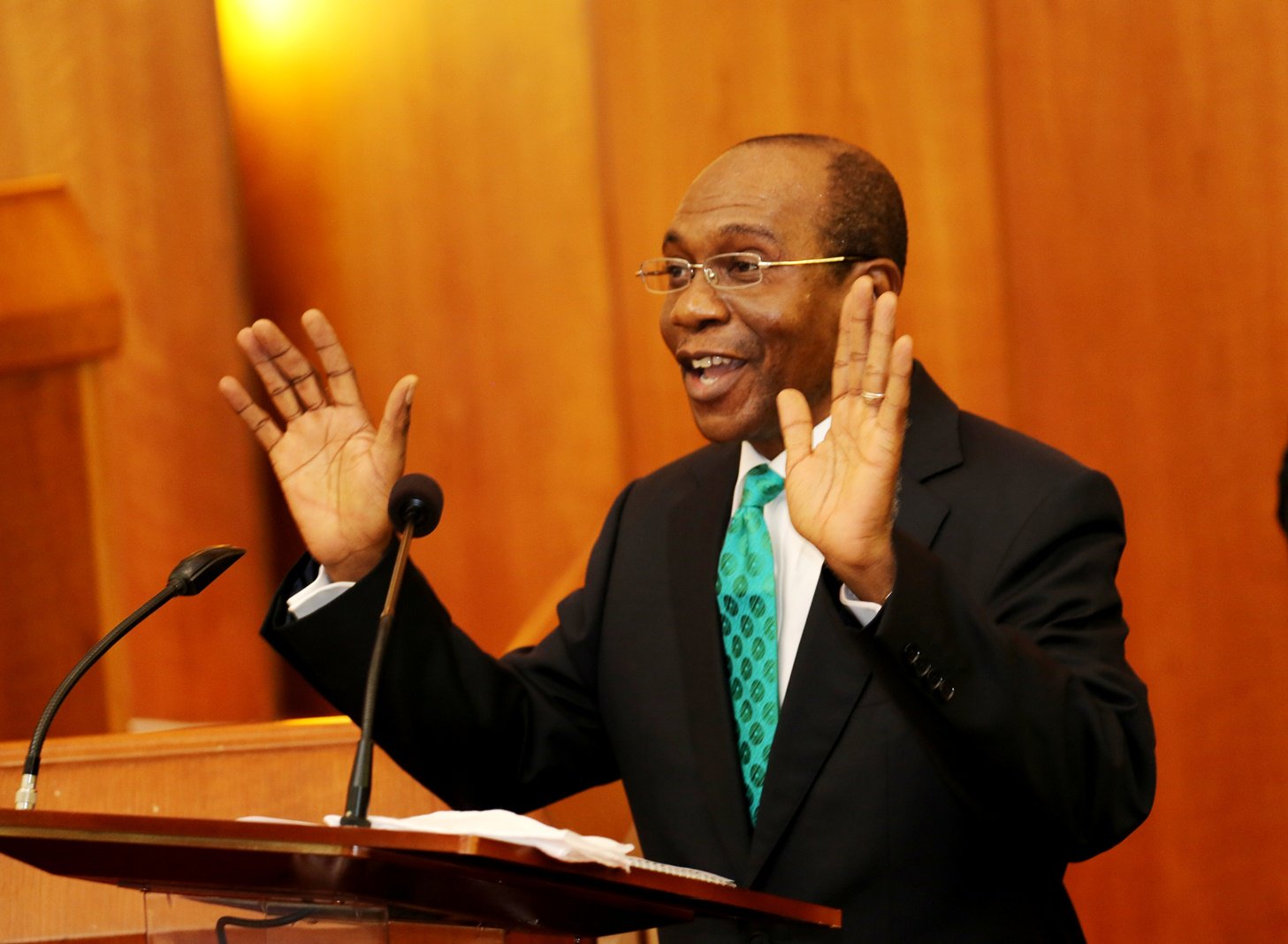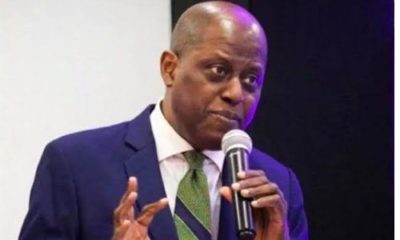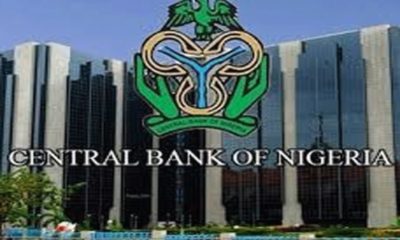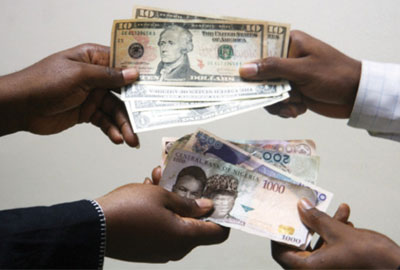Business
Depreciation: ABCON urges CBN to float Naira
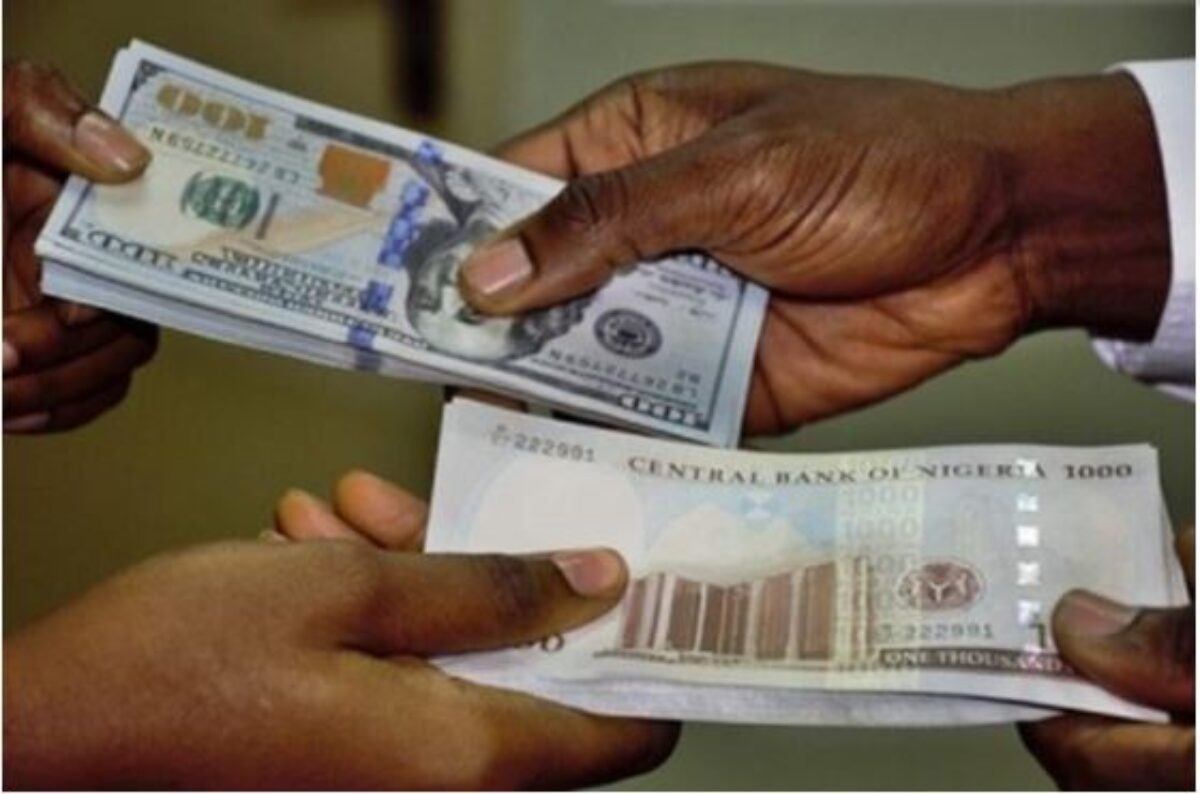
The Association of Bureaux Des Change Operators of Nigeria (ABCON) has urged the Central Bank of Nigeria (CBN) to float the Naira to halt its further depreciation.
The President of ABCON, Alhaji Aminu Gwadabe, made the appeal on Saturday in an interview with the News Agency of Nigeria (NAN) in Lagos.
Gwadabe said that the CBN should do all within its powers to undertake a sustained injection of dollar in the market to reverse the loss in the value of the naira at the parallel market.
“It might sound counterintuitive but the way out of the current frenzy is to abolish the official fixed exchange rate and allow the Naira to float.
“CBN should contemporaneously undertake a large-scale dollar intervention in the open market that can inspire confidence in the Naira and checkmate the current tailspin.
“Once there is a significant positive movement, the market will react and, in all probability, spur an avalanche of panic selling and further buoy the Naira,” Gwadabe said.
The financial expert said that the CBN could gradually buy back the Dollars used in its intervention from the open market at a lower exchange rate for a decent profit.
He argued that the the next phase would be to strengthen the Naira in the medium to long-term, adding that both fiscal and monetary policies should be aligned to stimulate the tradable sector.
On CBN’s Monetary Policy Rate (MPR) at 13 per cent, Gwadabe said that the adjusted rate would stifle growth.
He said efforts targeted at reducing Inflation in an underperforming economy should focus on stimulating the supply side.
“Increasing the MPR contracts the supply side, it is the wrong prescription.
“Let’s not copy the Americans who target inflation with FED rates to curb money supply; their factors of production have been fully mobilized, ours is at less than 20 per cent and requires stimulation of the supply side.
“Lowering the MPR to around 5 per cent looks more appropriate.
“The U.S. per capita GDP is around 66,000 dollars, ours is $1,500 in real terms which underscores the need for a pro supply side monetary policy,” Gwadabe said.
He said the CBN should reverse his mandate to banks to pay recipients of Diaspora remittances in dollars.
According to him, most of the dollars end up under pillows outside of the mainstream banking system with no utility for capital mobilization and imports.
“It fuels currency substitution, it puts pressure on the Naira exchange rate and inflation and does not have a statutory backing unlike Domiciliary accounts, therefore, it is illegal,” Gwadabe said.
The ABCON boss said that Nigeria had a long history of stifling the tradable sector (oil excluded), first through the Commodity Boards, the Arbitrage Kingpins, the bastion of corruption that straddled the export ecosphere whom Babangida dismembered in 1986.
“They bought low at the farm gates and sold high at the international export markets, much of the difference ended up in their private pockets.
“They impoverished the cocoa, groundnut, palm oil producers, etc. and eventually drove them out of business, not oil.
“Today, they have reincarnated as plethora of gatekeepers including the Nigerian Export Supervision Scheme at the ports exacting tolls from exporters.
“Poor infrastructure, power supply and generally unskilled labor further compound the weakness of our tradable sector.
“Any wonder why Ghana’s annual non-oil export is 13.1 billion dollars, while Nigeria’s is 1.3 billion dollars, We have a long way to go,” Gwadabe said.
He said that all the indices suggest that the Naira holds more of a downside potential than it does of an upside because the present monetary and fiscal authorities will continue to tether in the zone of docility.
The ABCON boss said the fall of the Naira is fueled majorly by the innate desire for self-preservation of some people and corporates who substitute a weaker currency for a stronger one.
He said that the paradigm has evolved over time to the current crescendo of panic buying of forex, most of which will end up under pillows and Offshore.
He said that this phenomenon can’t be adjudicated by the authorities.
“it’s typical consumer behaviour. Nigerians are sitting on an estimated 100 billion dollars chest outside the country’s mainstream banking system.
“Today’s panic buying causes currency to drop in value thereby inducing tomorrow’s panic buying which in turn results in further decline of the value of the currency and so forth.
“Panic buying is driven more by psychology and less by economic fundamentals, so the solution has to be psychological too,” Gwadabe said.
Business
Nothing Is Impossible, Dangote To Harvard Scholars

Young entrepreneurs and scholars have been urged to rise above limitations and push their ambitions to help transform the world into a better place.
The President/Chief Executive, Dangote Industries Limited, Aliko Dangote, gave the charge in Lagos last Wednesday when a delegation of Harvard Kennedy School scholars visited the Dangote Petroleum Refinery & Petrochemicals complex and Dangote Fertiliser Limited in Ibeju Lekki, Lagos.
Addressing the 50 scholars, representing 18 different nationalities from across the globe, Dangote emphasised the importance of being driven by ambition and a ‘can-do’ spirit, as exemplified by the Dangote Group in constructing the world’s largest single-train refinery.
He stressed that ambition should be paired with a desire to create a legacy and make an impact, not simply for profit.
ALSO READ: Okpebholo Stands With Tinubu On Rivers State
“Life is not worth living without ambition. In this life, nothing is impossible. Don’t allow fear to hold you back. Be knowledgeable about the business you want to pursue. I am not an engineer, but I don’t engage in any business I don’t understand,” he said.
Dangote, who spent over 40 minutes answering questions from the scholars, recalled being advised against building the refinery, as many argued that such mega projects were only feasible for sovereign nations, not individuals.
He shared that, during the COVID-19 pandemic, the company had to find ways to sustain the project.
He also noted that the ingenuity involved in constructing a world-class refinery, which meets global best practices, produces Euro V products, and is capable of processing over 100 different types of crude oil, has kept it running despite shortage of Nigerian crude oil.
Vice President, Oil & Gas, Dangote Group, Edwin Devakumar, explained that building the 650,000-barrel-per-day refinery was a monumental feat that required immense courage, vision, and determination.
He pointed out that the group acted as its own Engineering, Procurement, and Construction (EPC) contractor for the project – a refinery with a capacity of 650,000 barrels per day – a feat that had never been attempted before.
“Our Group President has a plaque in his office that reads, ‘nothing is impossible.’ This is the mindset he instilled in us when faced with challenges. He does not accept impossibilities and always aims for excellence. This approach was the same when we revolutionised the cement industry in Nigeria. We turned the country from one of the largest importers of cement into a net exporter. Today, after decades of depending on imported refined products, we now have the capacity to meet all of Nigeria’s refined product demands, with surplus supplies of jet A1, gasoline, and diesel for export. Other products from the refinery include polypropylene, carbon black feedstock, and sulphur,” he said.
Devakumar highlighted the significant investments made to realise the project, including dredging 65 million cubic metres of sand to raise the height of the site by 1.5 metres to safeguard against potential sea level rises due to global warming. The group also procured 330 cranes and lifting equipment due to the lack of local capacity, built the world’s largest granite quarry to supply materials such as coarse aggregates, stone columns, and stone dust, and constructed the refinery on 250,000 piles – potentially the largest number ever used for a single project.
The scholars, who toured the magnificent complexes, were in awe and praised Dangote for his ambitious vision, which seeks to address global needs. They commended him as an inspiration and entrepreneurial genius, with many describing the visit to the refinery as the highlight of their tour, which also included stops in Ghana and Abuja.
Sheffy Kolade, leader of the Harvard Kennedy School student-led Nigeria-Ghana Trek and a global advisor for the Women for Prosperity project with the Atlantic Council’s Freedom and Prosperity Center, said that the Dangote Group symbolises Nigeria’s resilience and economic transformation.
“I want to start by saying that the Dangote Group is not just a business. It is a symbol of Nigeria’s resilience. It is a symbol of the bright future that lies ahead for us. It represents the extraordinary achievements possible when we put our minds to something. I am happy that we are here to witness the economic progress happening in Nigeria. We’ve seen the largest single-train refinery in the world, and we’ve visited a fertiliser plant that exports to South America and the US,” she said.
A social entrepreneur and a member of the Forbes Business Council, Kolade added, “From where we are standing, thousands of people earn their daily livelihood. This business has created numerous jobs and energy security for our country. It has reduced our reliance on imported petroleum products, and, of course, it is increasing our foreign reserves. I want to thank you, sir, for everything you’re doing for our country and for Africa. We appreciate it. It’s truly inspiring for us.”
On her team and their mission at the refinery, Kolade noted, “My team consists of 50 people from 18 different nationalities. We have people from nearly every continent. We are a blend of policy, business, sustainability, and development-minded individuals, most of whom are from the Harvard Kennedy School. There’s one from the Harvard Business School, one from Harvard Public Health, and others pursuing joint degrees with Harvard, Stanford, and MIT. We are all curious-minded people who value impact, sustainability, and progress.”
Another member of the team, Darrow Merton, a Foreign Service Officer with the United States, described Dangote’s vision and resilience as an inspiration to entrepreneurs. He praised Dangote for not only breaking barriers to build the refinery but also for his ability to provide innovative solutions in the face of adversity.
Business
Global Money Week: NGX, CBN, MinieMoney Preach Financial Literacy To Students
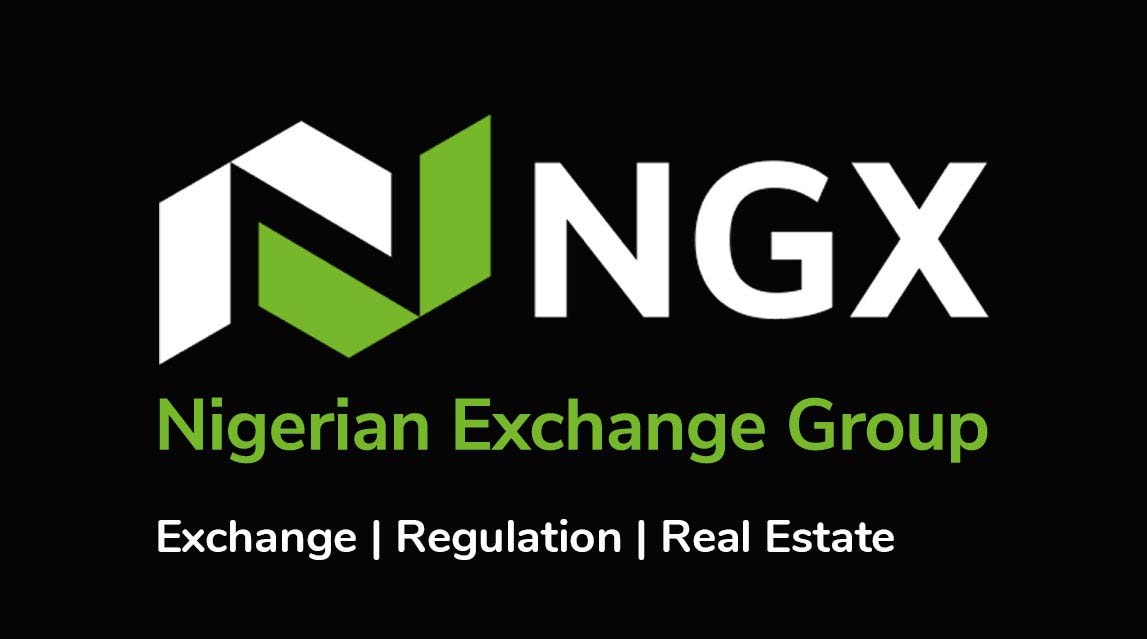
As part of activities in commemoration of the 2025 Global Money Week, the Nigerian Exchange Group (NGX Group) collaborated with the Central Bank of Nigeria (CBN) and MinieMoney to empower over 200 students with essential financial literacy skills.
Biztellers reports that the initiative underscores a shared commitment to fostering financial inclusion and equipping young Nigerians with the knowledge required for long-term financial well-being.
The event convened students from leading schools, including Vivian Fowler Memorial College for Girls, Dansol High School, Kith and Kin Educational Schools, Caleb British International School, Lagos Preparatory and Secondary School, and The Bells Comprehensive Secondary School.
ALSO READ: Tinubu Swears In Ibas As Rivers Sole Administrator
The participants engaged in insightful discussions on financial literacy, investment strategies, and capital market operations, with the added opportunity to experience firsthand the dynamics of the NGX trading floor.
Now in its 13th edition, Global Money Week is a global initiative designed to promote financial education among young people, ensuring they develop the critical thinking skills needed to make informed financial decisions. The 2025 theme, “Think Before You Follow, Wise Money Tomorrow,” reinforces the importance of strategic financial planning from an early age.
At the event, Head of Trading and Products at NGX, Abimbola Babalola, highlighted the transformative power of financial literacy in shaping students’ futures.
“The financial choices you make today will determine the quality of your life tomorrow. Understanding saving, investing, and responsible money management early on will put you on the path to financial success,” he stated.
On his part, Assistant Director of the Consumer Protection Department at CBN, Christian Mordi, introduced the CBN’s ‘Sabi Money’ platform, designed to enhance financial education nationwide.
“Financial literacy extends beyond numbers; it is about developing discipline, patience, and informed decision-making skills that foster economic security,” he noted.
Similarly, the CEO, MinieMoney, Gbolahan Faniran, emphasized the importance of early investment habits and leveraging the power of compound interest. “Achieving financial success is not about following trends but about making intentional money choices today that ensure a secure future,” he said.
Beyond this event, the NGX Group continues to champion financial literacy through strategic initiatives, including its X-Academy, which provides tailored financial education programs, and the NGX StockTown, a comic book series designed to educate young people through engaging storytelling.
Through partnerships like these, NGX Group remain steadfast in its commitment to raising a generation of financially literate and empowered individuals. By equipping students with essential financial knowledge today, the initiative lays the foundation for informed decision-making and long-term wealth creation, ensuring a more financially inclusive future.
Business
JUST IN: Dangote Refinery Suspends Fuel Sales In Naira

The Dangote Petroleum Refinery has announced a temporary suspension of petroleum product sales in Naira, citing a misalignment between its sales proceeds and crude oil purchase obligations, which are currently denominated in U.S. dollars.
In a statement issued on Wednesday, the refinery explained that its sales in Naira had exceeded the value of Naira-denominated crude it had received.
As a result, the company said it was necessary to adjust its sales currency to align with its crude procurement requirements.
The refinery also addressed online reports alleging that loading activities had been halted due to ticketing fraud.
Dismissing the claims as “malicious falsehoods,” Dangote Refinery assured stakeholders that its systems remain robust and that no fraudulent activities had occurred.
The statement reads, “We wish to inform you that, Dangote Petroleum Refinery has temporarily halted the sale of petroleum products in Naira. This decision is necessary to avoid a mismatch between our sales proceeds and our crude oil purchase obligations, which are currently denominated in U.S. dollars.
“To date, our sales of petroleum products in Naira have exceeded the value of Naira-denominated crude we have received. As a result, we must temporarily adjust our sales currency to align with our crude procurement currency.
“Our attention has also been drawn to reports on the internet claiming that we are stopping loading due to an incident of ticketing fraud. This is malicious falsehood. Our systems are robust and we have had no fraud issues.
“We remain committed to serving the Nigerian market efficiently and sustainably. As soon as we receive an allocation of Naira-denominated crude cargoes from NNPC, we will promptly resume petroleum product sales in Naira.
It added “We appreciate your understanding and cooperation during this period”.


